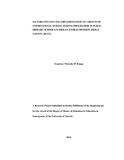| dc.description.abstract | Hungry pupils do not concentrate in learning. The school feeding
programme is an effective tool in reducing pupils drop out rate.
Subsidized meal programmes are used in primary school to promote
enrollment and retention of rural children education and play an integral
part in realizing the country’s goal to universal education. Hungry pupils
are likely to miss out schooling, becoming impoverished in future due to
lack of education if not assisted with school feeding programme. The
purpose of the study was to investigate the factors influencing
implementation of Child Fund’s International School Feeding
Programme in public primary schools in Isiolo Central Division, Isiolo
County. The study was guided by the following three objectives. How
community participation, clan conflicts and procurement influences the
implementation of Child Fund’s School International Feeding
Programme. The target population was 10 primary schools in Isiolo
Central Division that Child Fund International has implemented the
school feeding programme, 10 headteachers, 110 teachers and 279 class
eight pupils and 5 Child Fund International School Feeding Programme
Officials. The study employed a descriptive survey design. The sample for
the study comprised of 10 headteachers, 120 teachers, 5 Child fund
officials and 84 pupils. Data was collected using questionnaires and focus
group discussion. Piloting was done to gauge the validity of the
instruments items. Community participation had the highest reliability
(α=0.834) followed by Procurement of food (α=0.763) and finally
Persistent clan conflict (α=0.757).This illustrated that all the three scales
were reliable as their reliability values exceeded the prescribed threshold
of 0.7. Findings on the influences of community participation on the
implementation of Child Fund’s International School Feeding programme
revealed that community passively supported the Child Fund’s
International School Feeding Programme. It further came out from focus
group discussions of the pupils that the parents participated in the Child
Fund International school Feeding Programme only if money was used as
incentives. Procurement of food revealed that the schools were located in
an inadequate food supply area as indicated by majority 6(60.0%) of
headteachers. The study too revealed that the area suffers conflict hence
the programme has suffered sometimes, though food acted as a tool to
retain pupils in school as was indicated by majority of the pupils 44
(53.7%), hence it mitigates the conflicts and clan clashes by providing a
sense of routine, stability, structure and hope for the future because it
offers safe spaces for learning. Based on the findings the study concluded
that community participation was minimal, procurement of food was
done by the administration with less involvement of the community
members and the area suffers conflicts. The study recommended that to
ensure ownership of the school feeding intervention school
administration, School Management Committee and Child Fund
International should ensure community participation and responsibility
in school feeding programme. The researcher
administration, School Management Committee and Child Fund
International should ensure community participation and responsibility
in school feeding programme. The researcher therefore suggested that
further study to be conducted in a larger area to ascertain the
implementation of Home Grown School Feeding Programme in public
primary schools. Since the study was carried out in a rural setting, there
is need to conduct a similar study in an urban informal settlement so as to
compare the results. | en_US |

